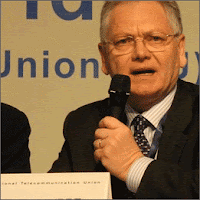Media in Italy
Roberto Spiezio, citizen journalst from Italy, is interviewed about his entry into the world of journalism.
After my interview with Mr. Spiezio in South Korea, we corresponded by email and he was kind enough to offer more information about politics and media in his home country of Italy.
LP: Thank you in advance for your perspectives on life in Italy, Roberto. First, let me ask, how does Italy view immigration?
RS: This is a really sensitive issue and one of the usual battlefields for the political parties. The left wing has a policy of aperture about immigration, because of ideological matters and because immigrants are a good source of political consensus.
At the moment the government (left wing) has given many immigrants a resident status, as long as they have a regular job. In the past few years the right wing government had cracked down on immigration, by making the entrance and the staying in Italy a lot more difficult. As example, a Korean friend of mine came to visit me 2 years ago, and the army stopped her and told her if she didn't notify her presence -even as a tourist- within 7 days with the authorities, she could have been immediately expelled and banned from the country for 5 years - and she was just a tourist!
In Italy immigrants don't have the right to vote, even if they are permanent residents, whereas relatives of native Italians abroad, even if they are not Italian citizens, do have it.
This is one of the points the present government is going to address, along with the problem of the legal status of the 2nd and next generations of immigrants, citizens by birth or not.
Finally, the enterprise world in Italy is demanding more immigrants, because the economy needs it, and this affects the choices of the government in a decisive fashion often times.
LP: What is mobile phone use like in Italy?
RS: In Italy mobile phones are really widespread. Many Italians have more than one, and even elementary school kids tend to have it. Born as a status symbol, now it's more a common consumer device, like the TV or the radio. The most widespread technology is GSM, an European standard not compatible with Eastern Asian one (CDMA 2000) but UMTS (a standard introduced for multimedia streaming) is gaining consensus, since it allows people to make video calls and watch TV, while browsing the Internet at broadband speed, but the service doesn't cover the whole territory yet, we are far from reaching a 100% covering actually.
Recently Italy has been witnessing a springing up of services connected to the use of the mobile phones, especially silly subscriptions services (love compatibility and stuff) and it has been also introduced the TV service. Sky Italia is on the frontline in this new development.
The market seems to have reached its saturation since there are a number of mobile providers that have not changed for years now.
LP: What can you tell me about RAI?
RS: RAI TV is not exactly a private enterprise. As a state television, it has a character of public service, like PBS in America and it's divided into a number of companies that have a specific area of the industry to take care of, from advertising to new media.
Rai receives public funding, especially through subscription fees paid by the viewers. An anomaly is that this fee is conceived as a government tax on the possession of the TV set, so everyone is supposed to pay it, even if doesn't watch the channels. The management is appointed by a parliamentary commission, so there is a heavy political control as to how the company is run.
There are plans and petitions to exclude this pervasive political control over the service, and a real privatization is, as far as I know, not favorably welcomed by many, since the original character of public service would be "betrayed."
The overall quality of this network is good, apart from a questionable tendency to multiply quiz shows and "reality shows" like big brother and others, in that there are several competent journalists, and the offer is quite wide, even if some of the most interesting channels can be viewed only via satellite or in the new digital terrestrial platform. But in my opinion, just because of the political control over the management, a complete independence can't be assured. This is particularly evident in the news branch of the network.
LP: And how about SKY Italia?
RS: This is quite an interesting problem. Sky Italia is the only satellite provider in Italy, after the debacle of Telepiu and Stream. Its offer is wide and overall good quality in my opinion, even if too expensive for the average viewer. Nowadays SKY is under the spotlight because of the big soccer scandal ongoing, and the problem of the game transmission rights (collectively contracted or team by team). In Italy many don't see SKY as a positive reality, since it has a monopoly in its particular branch of the media.
LP: What about globalization or “delocalizzazione”?
RS: This is a relatively recent and controversial issue in Italy. It's recent because we "woke up" to comparing with other countries, and started facing the problem when other countries already were actuating their own solutions. It's controversial because the economy in Italy is not as good as before, the cost of living and for energy has risen dramatically over the past few years, and de-localization unavoidably brings job decreases and desperation in many people made redundant.
In my area there are the major eyewear companies in the world, producing glasses for the most important brands, including Ray-Ban and Prada. Some of them have started a delocalization project, and the main destination is China.
The pros of such a kind of phenomenon can be seen only for the enterprises in my opinion, in that they can reduce costs while gaining higher profit. I still have doubts about the quality of the products made in China, though. Cons regarding job descreases, and all the social problems related to that, including destroying entire communities that were totally built around a single factory in many cases.
LP: How do the quasi poveri connect and use the Internet, as well as get their news? Do they trust the large media companies? If not, then who?
RS: The Digital Divide in Italy is still a grave and serious problem. While we are supposed to be an "advanced country" there are still many towns and villages without broadband connection. Some organizations are trying to propose a project to adopt a policy for bringing the broadband virtually everywhere. The real matter is not the access to the internet by quasi poveri, but the access to the internet and its diffusion as well as the creation of an "internet culture" as a whole.
Some enterprises have introduced Wi-Fi in rural areas or villages not covered by the wired broadband connection.
The de facto monopolistic situation of Italian telephony, whereby one company owns all the infrastructure and forces the other providers to abide by the rules and the prices imposed by it, has created a really difficult situation: the prices for a flat internet connection are comparatively higher than in other European countries, and the quality is nearly always unsatisfactory.
The access to news is mostly traditional: TV, newspapers and then radio. People are divided about trusting mainstream media. As I perceive it, while the majority still relies on them, especially the well-established media, such as Corriere Della Sera and Republica, the most important newspapers in Italy, there are many people more and more dissatisfied with them, in search of something better. Proof is in the springing up of "counter information" and alternative information websites. Their quality is not always good, because there seems not to be any form of editorial control, and anyway they are regarded as niche realities that have nothing to do with the "serious" and "official" media.
My perception is that as long as a publication can pose itself as a credible and authoritative alternative to the mainstream media, it can break in and become a point of reference.
Related items:
http://www.imdb.com/title/tt0482633/
http://www.cjr.org/issues/2006/5/Stille.asp
http://www.vivazapatero.co.uk/


